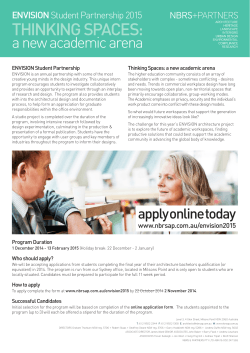
Falls Resources for Community Care
Falls Resources for Community Care Policy NSW Ministry of Health: Prevention of Falls and Harm from Falls in Older People 2011-2015. This policy directive describes the actions that the NSW Ministry of Health in collaboration the with Clinical Excellence Commission (CEC) will undertake to support the prevention of falls and fall related harm among older people in 3 key domains; health promotion, NSW Health Clinical services and NSW Health Residential Aged Care Services. This policy can be accessed at http://www.health.nsw.gov.au/policies/pd/2011/PD2011_029.html Evidence Based Guideline Australian Commission on Safety and Quality in Health Care (ACSQHC) 2009, Preventing Falls and harm from Falls in Older People: Best Practice Guidelines for Australian Community Care. These guidelines can be accessed at: http://www.safetyandquality.gov.au/our-work/falls-prevention/ Preventing Falls and Harm from Falls in Community Care: CEC Power Point Presentation http://www.cec.health.nsw.gov.au/programs/falls-prevention/resources-community - scroll down to the PowerPoint presentations Community Resources Staying active and on your feet- booklet produced by NSW Health for patients and carers, includes health and lifestyle checklist, strength & balance exercises to do at home, home safety checklist, and how to get up from a fall. Copies can be ordered from: Active & healthy website: http://www.activeandhealthy.nsw.gov.au/your_active_and_healthy_guide Staying active and healthy to prevent falls – Home based balance and strength exercise DVD. A physiotherapist explains the strength and balance exercises that can be done at home with two older people demonstrating these exercises. The final section is a physiotherapist who was part of the team that developed the LiFE (Lifestyle Functional Exercise Program) program showing how these exercises can be incorporated into daily life. The video can be accessed at http://www.activeandhealthy.nsw.gov.au/ CEC Falls Prevention – one page flyers – for patients, carers, and families and addressing the main falls risk factors, some are also available in some community languages (Arabic, Simplified Chinese, Traditional Chinese, Vietnamese, Greek , Italian, Russian, Serbian, Croatian, Macedonian and Portuguese). Copies can be downloaded at: http://www.cec.health.nsw.gov.au/programs/falls-prevention/falls-one-page-flyers Exercise Resources Active and Healthy website-. www.activeandhealthy.nsw.gov.au this website contains a database of exercise programs in NSW that include sufficient strength and balance components for falls prevention. The programs can be accessed by suburb/town and provide information on location, time and cost of classes and contact information and other relevant details. Best-Practice recommendations for Physical Activity to Prevent Falls in Older People- this report commissioned by the Ministry of Health to answer questions around the types, frequency and intensity of physical activity that are most effective in reducing the risk of falls in older people. The report can be accessed at http://fallsnetwork.neura.edu.au/wp-content/uploads/2014/02/aaa-sax-pa-falls.pdf Stepping On – http://www.steppingon.com/ this website provides information and resources on the Stepping On program. LiFE (Lifestyle Functional Exercise) Program – this evidence based program incorporates balance and strength training into everyday activities. For further information and to purchase a training manual and participants manual go to: https://sup-estore.sydney.edu.au/jspcart/Search.do?searchTitle=Life&searchAuthor=Clemson 1 Resources for Community Care (Updated March 2015) Falls Risk Tools FROP-Com Falls Risk Screening Tool This tool is a risk screening tool developed by the National Ageing Research Institute (NARI) and can bedownloaded at: http://www.mednwh.unimelb.edu.au/nari_tools/nari_tools_falls.html If you wish to use the most recent version of this tool please contact NARI at info@nari.unimelb.edu.au QuickScreen® Falls Risk Assessment Tool This tool has been validated for use in the community setting. This is a multifactorial risk assessment tool that measures a range of falls risk factors including, previous falls, medication use, vision, peripheral sensation, balance and co-ordination. QuickScreen costs $A310 plus postage (within Australia $A12 per kit) and is available from the Falls and Balance Research Group, Neuroscience Research Australia at: http://www.neura.edu.au/research/facilities/falls-and-balance-research-group/quickscreen Home Safety Check List Staying active and on your feet-this booklet includes a home safety checklist and health and lifestyle checklist, Copies can be ordered from: Active & healthy website: http://www.activeandhealthy.nsw.gov.au/your_active_and_healthy_guide Presentations on CD ROM NSW Falls Prevention Network Forum 2014- the plenary presentations at this forum held in May 2014 were filmed and are available on DVD. Professor Carolyn Di Guiseppe on Church-Based Social Marketing motivates Older Adults to take Balance Classes for Fall Prevention. This presentation discusses the social marketing of the N’Balance classes through churches in Mesa County Colorado. These CDs can be ordered by emailing Esther Vance, e.vance@neura.edu.au, there is no charge. Websites Active and Healthy- www.activeandhealthy.nsw.gov.au. This website enables you to find Falls Prevention Exercise Programs in your local area, includes simple and essential home based exercises, health and lifestyle checklist and tips and home safety checklist. NSW Falls Prevention Network - https://fallsnetwork.neura.edu.au This website provides useful resources and information on falls prevention including policy, guidelines, reviews, newsletters, resources and meeting presentations. Clinical Excellence Commission: NSW Falls Prevention Program http://www.cec.health.nsw.gov.au/programs/falls-prevention This website contains a summary of the NSW Falls Prevention Program with information and resources to assist Local Health District staff to prevent falls and harm from falls in their setting. These resources include: One page summaries: Community Best Practice guidelines and patient/client flyers April Falls Day information and resources NSW Multicultural Health Information Service This website has a range of resources around falls prevention in a range of CALD languages these include one page summaries on staying active, improving balance, making the most of your eyesight, prevent falls in public places, stay on your feet with safer shoes, home safety for falls prevention, these can be accessed at: http://www.mhcs.health.nsw.gov.au/publicationsandresources#b_start=0&c1=Falls&c1=Injury+prevention 2 Resources for Community Care (Updated March 2015)
© Copyright 2025











